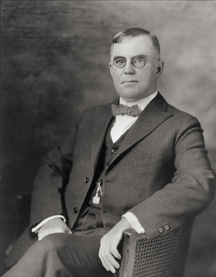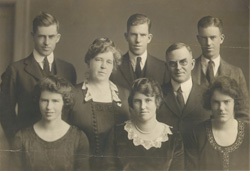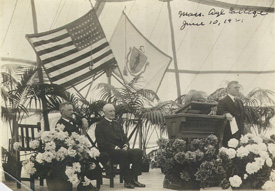Equality for Agriculture
Editor of Wallaces’ Farmer 1916-1921
U.S. Secretary of Agriculture 1921-1924
Henry Cantwell Wallace (Harry), the eldest son of Henry and Nancy Cantwell Wallace was born in 1866 in Rock Island, Illinois, where his father was ministering. As he grew up, the family moved into the journalism business in Winterset, Iowa and Harry became his father’s apprentice. In 1885, Harry entered Iowa Agricultural College in Ames, Iowa (now Iowa State University). There he met May Brodhead whom he married in 1887. Harry quit school and moved with his wife to a farm near Orient, Iowa.
In 1892, at the request of James “Tama Jim” Wilson, Henry C. moved the family back to Ames to complete his degree and became an Associate Professor of Dairy Science. In 1893, Henry C. and his brother John became partners with Professor Curtiss to publish Farm and Dairy, which later became Wallaces’ Farmer. The Wallace family befriended George Washington Carver, the first African-American student at Iowa State College. Carver was a botany student and allowed young Henry A. to accompany him on expeditions in and around Ames. Henry A. later credited Carver with encouraging his early interest in plants and botany.
Henry C. handled much of the daily details at Wallaces’ Farmer, and became editor when his father, “Uncle Henry,” died in 1916. Henry C. was a leader of Des Moines civic activities, especially the YMCA and the Red Cross. He helped establish 4-H and Extension programs in Iowa, and was a leading figure in the organization of the American Farm Bureau. He was longtime president of the Cornbelt Meat Producers Association. Appointed Secretary of Agriculture by President Harding in 1921, Henry C. Wallace promoted programs for American farmers struggling against over-production and the collapse of farm prices following the first World War. He achieved a distinguished record as an administrator, framer of agricultural policies, creator of the Bureau of Agricultural Economics, and promoter of equality for agriculture and a better rural society. He died unexpectedly following gall bladder surgery in 1924. His book, Our Debt and Duty to the Farmer, was published posthumously.
Bibliography
Education for the Iowa Farm Boy. Des Moines: The Prairie Club of Des Moines, 1910.
Our Debt and Duty to the Farmer. New York: The Century Company, 1925.



